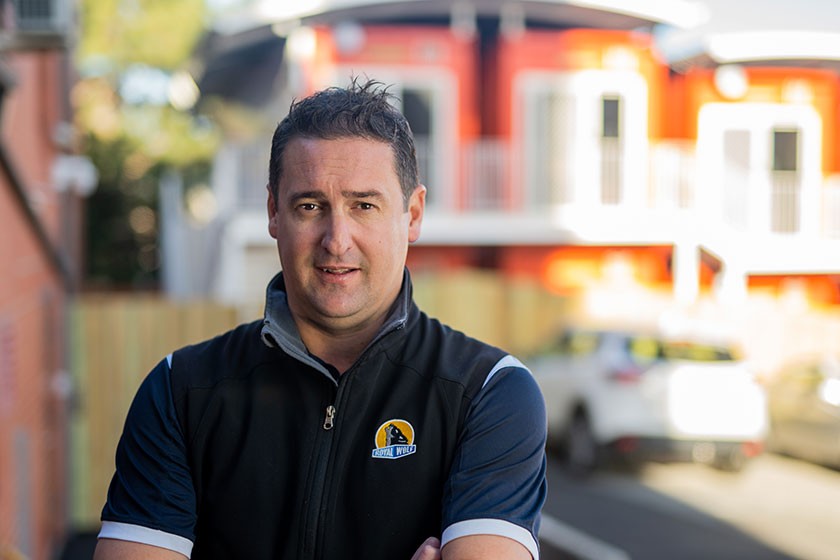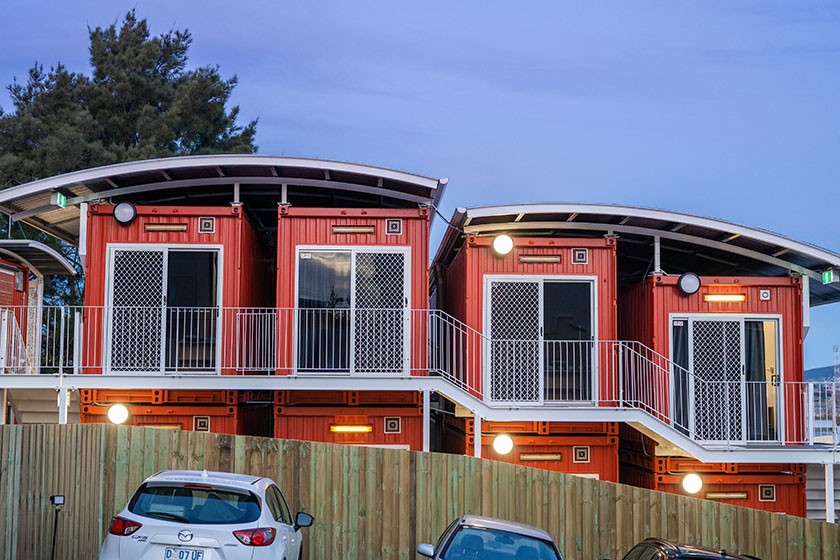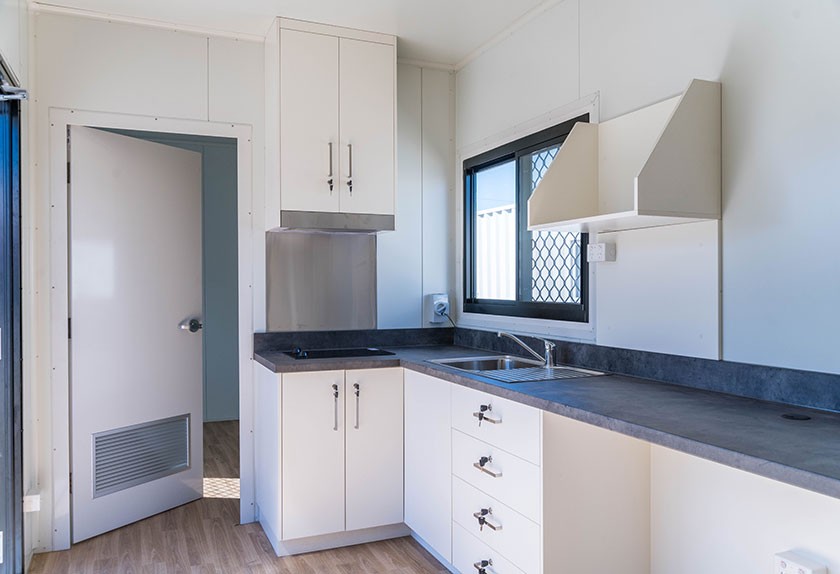

Royal Wolf Business Development Manager (Tasmania) Michael Nicholson has steered the crisis accommodation project that has seen 18 converted shipping containers become homes for men at Bethlehem House. Photo: Nick Hansen
By Geoff Shearer
On first inspection it is a product that doesn’t appear to align itself comfortably with business strategies requiring diversification, creativity or innovation.
The ubiquitous, ribbed-steel shipping container that you see stacked in its thousands like discarded building blocks at ports across the country, is all about no-nonsense functionality. Standard containers typically come in two sizes - 20-foot (6.06m long, 2.44m wide and 2.6m high) and 40-foot (12.19m x 2.44m x 2.6m) - and a preferred colour of muddy-red.
But Royal Wolf, Australia’s largest supplier of shipping containers for hire, sale and specialised modification in the domestic market, has shown that even the most rigid of products can be re-imagined when a company needs to adapt to the market, and when a society comes calling for solutions.
In recent years, Royal Wolf’s containers have been deployed for use as uni student accommodation, a food market village and, most recently, as crisis accommodation for the homeless in Tasmania, in an innovative scheme that has drawn widespread interest among groups working in the sector.
CEO Neil Littlewood says the “reinvention” of the shipping container has been vital to Royal Wolf’s success over its 25-year history.
Originally established as a wholly owned subsidiary of San Francisco-based container lessor Triton International Inc to offload secondhand containers in the Australian market, it was refined into a sales and rental business. Several ownership changes, including a return acquisition by current owner US General Finance Corporation, has seen the company focus on rental, sale, modification and refurbishment of its product.
The company’s listing on the ASX in 2011 was a capital expansion move so it could meet the demand from the then-booming mining sector for camp accommodation.
When that bubble burst, Royal Wolf took a hit.
"Yes we did, as did many Australian companies associated with the resource sector," Mr Littlewood says.
"So we came to a rethink of our business. But within that, the fundamentals have stayed the same. It is about identifying requirements for solutions – whether they are for storage of dry goods, frozen goods; or for providing accommodation on a worksite; or, like what we are doing in Tasmania, being part of a solution tackling the homelessness crisis.

The pods were completed in May 2020. Photo: Nick Hansen
"To diversify, we turned down the dial on camp accommodation, but we increased the dial on worker accommodation at civil construction sites. That's where we have built a niche in the market.
"And as a company it helped us learn about ourselves and what we could do. That was one of the most exciting things about the company and the containers. Most people have this view that it is just this steel container, but what you can do inside that is quite interesting. People all over the globe, not just Australia, have come up with some sensational solutions for using these containers, using their structural integrity. There have been some great fit-outs."
Those solutions have been as huge as China’s 1000-bed pop-up hospitals, each using hundreds of containers, built in a matter of days to address COVID-19; and as small as the single white container carted from city to city around the world, including Australia, by UK immersive-theatre company Darkfield, decked out inside to resemble a commercial aircraft.
Royal Wolf’s largest projects to date have been in the mining and construction sectors, but their diverse work includes Eat Street Northshore in Brisbane, a purpose-built container village where the units are used as food kiosks, bars, walkways, perimeter walls and storage. Also in Queensland, Royal Wolf containers were stacked three-high as green walls on the film set of Pirates Of The Caribbean: Dead Men Tell No Tales on the Gold Coast in 2015.
During the current COVID-19 pandemic, the company has been instrumental in providing emergency response testing stations and, in Geelong, the modification of a container into a visitors’ pod at an aged care facility.

Royal Wolf teamed up with former director of Girvan Waugh PTY Warwick Waugh to produce innovative COVID-19 temperature testing units. Photo: Contributed
"Our design team has about 15 different configurations (for pandemic response buildings)," Mr Littlewood says. "And that information was forwarded as diagrams to respective state governments for their consideration. All acknowledged the options and were set to move should the situation have worsened.
"Our New Zealand team has a great working relationship with NZ’s Department of Emergency Services and have worked on some great solutions for them."
The company’s largest long-term solution project has been the 85-container build last year to provide accommodation for some 180 live-in students at the University of Tasmania's (UTAS) Sandy Bay campus. About 60 converted 40-foot container "pods" each house three students while the rest of the containers were used for admin areas, access and creating linking walkways.
As a result of the uni project, the Tasmania State Government approached Royal Wolf to assist in addressing the state’s homelessness crisis. The solution was 18 shipping containers fitted out as single-person pods installed two-high at Hobart’s Bethlehem House, a homeless accommodation service for men; and 10 larger containers for use by the Hobart Women's Shelter as crisis accommodation for women and children affected by domestic violence.

Inside the 40-foot shelters being installed at the Hobart Women’s Shelter. Photo: Alastair Bett
The Tasmanian Government commissioned the units, including a further seven units for the women's shelter, under its $5 million Emergency Homeless Response package, part of a massive eight-year $258 million Affordable Housing Strategy.
Mr Littlewood says the entire company and the local team in Hobart have a sense of pride in being able to be part of the solution. "And I really applaud the Tasmanian Government for thinking about innovative ways to address problems and their progressive approach to the issue," he says.
"To me it is about understanding what governments, councils and clients are looking for; analysing that; providing an innovative and individual solution for them; and then delivering on that in a timely manner. That is our core function."
So while the humble shipping container still remains more utilitarian than utopian, its role and relevance in society has never been more diverse.